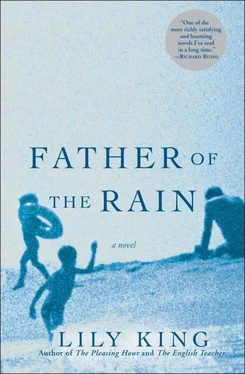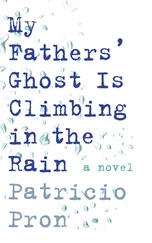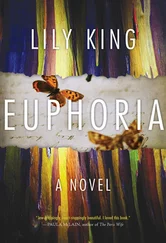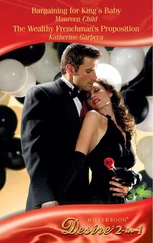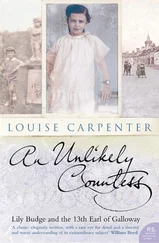“Hello, elf.”
“Dad, I’m taking you to the hospital.”
“All right,” he says. He sounds grateful, as if he’s been waiting a long time for somebody to say those words.
I know the way to the hospital in Allencaster. Mallory and I were candy stripers there one summer. We take my father’s car with automatic windows and seat levers. The steering wheel has a thick leather sheath. He falls asleep before we hit the highway. Every few minutes I poke him.
“Why do you keep doing that?” he says.
“Just checking on you.”
“Don’t check on me anymore.” Unlike my brother, he seems not to have aged at all. He looks as I always remember him, tanned, taut, and bony. The knees beneath his khakis are the same knobs I’ve seen all my life. I find myself wanting to stare.
He smells of alcohol and I’m glad. The doctors will notice. Maybe they will suggest a treatment center. Maybe this is the proverbial rock bottom.
It’s a small hospital with a small parking lot. We get a spot near the door. I help him out of the car and he walks slowly, more bent over than usual, one hand shielding his bad eye. I steady him, relieved when I see a wheelchair out in front of the door. I steer him toward it but he bats the idea away with his free hand and the word pansy and keeps walking.
After my father is admitted, I return to the desk and ask if I can see Dr. Perry Barns, who was his internist and occasional doubles partner when I was growing up. He comes quickly, short-limbed in his white tunic, one lone tuft of silver hair left on the top of his head. I barely know him; he is just a name I’ve heard on Myrtle Street all my life.
“Look at you!” he says from the doorway. People in the waiting room glance up at the unnecessary boom of his voice. He begins shaking his head. “You were this high.” He puts a flat hand level to his kneecap
I stand and he gives me a hug and a moist kiss too close to my mouth.
“I’m sorry to bother you, Dr. Barns. It would just make me feel better if you’d take a look at him.”
“At who?”
“At my father. I’m sorry. I thought they had explained—” I glance over at reception. The chair is empty.
“What’s going on?” Like that, he switches from country club parent to doctor. I feel my body relax.
I tell him what I know, and he disappears through the swinging doors. I zone in and out of The Price Is Right .
When he comes back a few minutes later, he is smiling again. He sits next to me in a plastic chair and puts his hand on my leg. “You.” He squeezes the skin of my thigh several times. “You are all grown up.”
It would be one thing if I were recently grown up. But I am twenty-nine years old. “Could you tell me about my father?”
He pulls back his hand. “He’s going to be okay. Honkey-donkey, as my daughter used to say.” I never knew what a moron this guy was. “He’ll be hitting those famous crosscourt volleys in just a few days.”
“I’m concerned about his drinking.”
“Drinking?”
“Since Catherine left, he’s been on a bit of a tear.”
“Your father has never been a binger.”
I laugh. “You’re right. More of a steady alcoholic.”
He frowns. “Oh, now, alcoholic is a strong word. He likes his martinis, I’ll grant you. But that’s never been a problem .”
I have a swirling slippery feeling in my stomach. I feel the small stool in St. Thomas beneath me. “You’re right. I’m exaggerating. Please don’t mention to him that I said that.” I don’t need my father’s fury turned on me during the forty-eight hours I’ll be in Ashing.
He smiles. “I won’t.” He puts his hand back on my leg and squeezes a few more times. “I promise.”
My father is wrapped up in a lot of bandages, and in many more places than I thought he’d been hurt: both wrists, one ankle, his entire forehead, and around his chest. The wrist wraps look hasty and uneven and I wonder if he did it himself when the nurse left the cubicle. Once he has the bandages on he becomes even more frail, moving more slowly to the car than he did into the hospital.
When we get home I take him directly upstairs to his bed, hoping I can steal a little sleep as well. But as I’m leaving the room he says in a small voice, “Any lunch down there?”
At least I know what to make him: three hot dogs, no bun, and a sliced tomato slathered with mayonnaise. I’ve seen him eat that lunch my whole life. Tomatoes and hot dogs are the only edible things in the fridge. The other vegetables have blackened; the milk has gone sour. There is an explosion of dirty dishes in and around the sink. As far as I can tell, Garvey and my father ate everything with ketchup, which has now hardened into a scarlet shellac on every plate. I can’t cook, can’t even boil hot dogs, in such a filthy kitchen.
He looks at the clock when I come in with his tray, but he doesn’t complain about how long it took me.
He sits up and puts the plate in his lap and says, “This is terrific.” He picks up one of the pink-gray tubes of pig intestine, dips it in the mound of ketchup, and raises it to his open mouth. It makes a pop as it splits between his teeth.
“You have yours already?”
I realize I’m hovering.
“No, I—”
“Want some?” He pushes his plate toward me.
“No, I don’t—” eat meat , I want to finish, but can anticipate the mockery too well. “Thanks anyway.”
He confuses me. He disgusts and compels me. I don’t want to stand and watch him eat three hot dogs (I had to use several different utensils to get them out of the package and in and out of the boiling water without having to touch them) and yet the sight of his fingers, the tip of a pencil embedded since kindergarten above the knuckle of his first finger, the long yellowing thumb steadying the plate, keeps me in place.
“Sit down. You’re making me nervous.” He says it in a bad New York accent. Noyvus. He points to the wooden chair in the corner. I pull it up to the bed.
He cleans the plate, then puts it on the bedside table. He lies back on his pillows.
“Dad, will you tell me what’s been going on here?”
He closes his eyes and shakes his head. “You can’t imagine what I’ve been through.”
I wait.
His eyes flash open. “Do you know what that ungrateful asshole brother of yours said to me?”
“No, but let’s start at the beginning. What happened with Catherine?”
He looks at me blankly for a moment, as if there’s only room for one enemy at a time in his head. Then he smiles before shaking his head again, even more slowly this time. “Now there’s a real beauty. There’s a real little cunt for you.”
“You had a big fight?”
“No we didn’t have a big fight.” He isn’t one for narrative unless it has a punch line. “She just took off and I said good riddance.”
“Were you home?” Did Catherine leave in the same way my mother had, on the sly, a note on the kitchen table? It seemed the only way.
“Yes. I was in the poolhouse. She drove right past me.”
“What time of day was it?”
“About nine in the morning.”
I figured she’d left in a drunken midnight rage, not on a sunny Saturday morning.
“She came crawling back, too, the next day. But I had a gun and told her to get off the property.”
“A gun?”
“Damn right.”
“A BB gun?” I try not to smile.
“If you aim it in the right place, that thing can do some damage.”
“Dad, you and Catherine have been together a long time.”
“Worst years of my life.”
“Really?”
“Well, some of the worst.”
“I’m going to talk to Catherine. I know you can work this—”
Читать дальше
